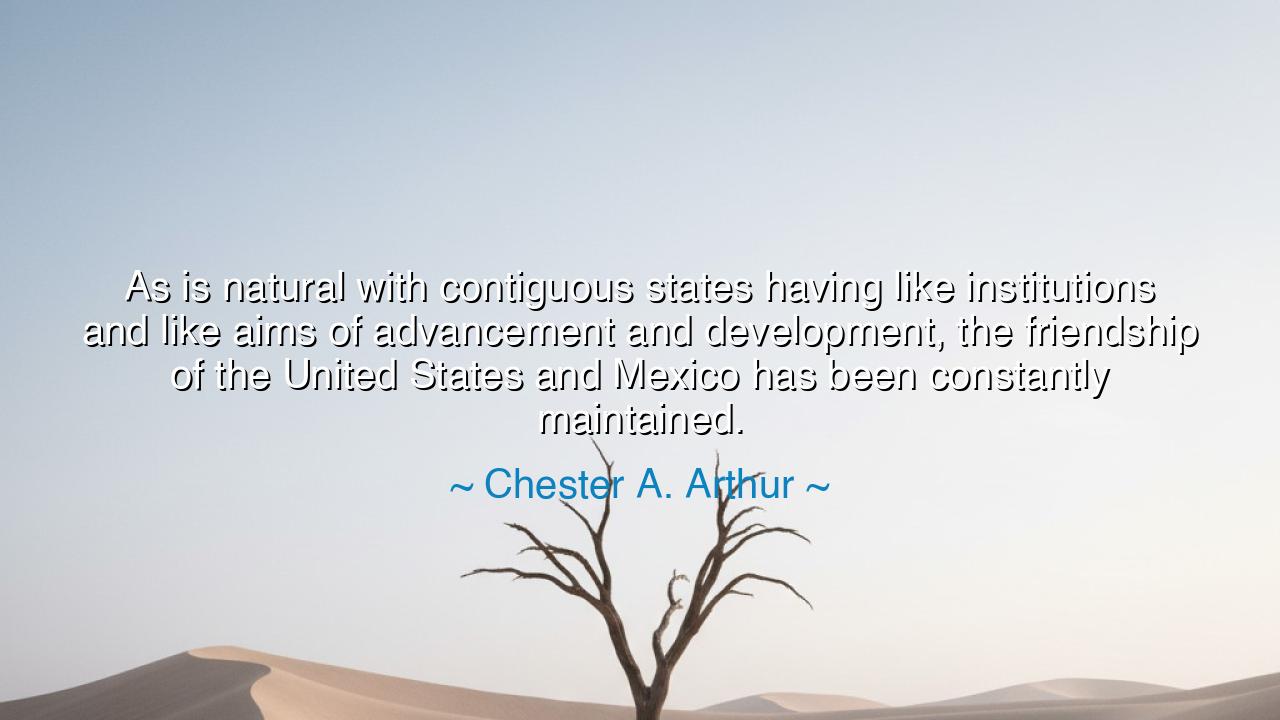
As is natural with contiguous states having like institutions and
As is natural with contiguous states having like institutions and like aims of advancement and development, the friendship of the United States and Mexico has been constantly maintained.






"As is natural with contiguous states having like institutions and like aims of advancement and development, the friendship of the United States and Mexico has been constantly maintained." Thus spoke Chester A. Arthur, the twenty-first President of the United States, a man who governed in an age of rebuilding, when nations sought peace after the tempests of war and division. His words, though spoken in the measured tone of diplomacy, carry the quiet rhythm of wisdom. In them, he recognized an ancient truth — that friendship between nations, like that between men, is strongest when born of shared purpose, mutual respect, and the nearness of destiny.
Arthur’s time was one of renewal. The wounds of the American Civil War were still tender, and across the southern border, Mexico too was emerging from the storms of revolution and reform. Both nations, neighbors joined by geography and history, looked toward the same horizon: advancement, development, and the hope of stability. Yet between them lay not only rivers and deserts, but the memory of conflict — the Mexican-American War, and the shadow of mistrust that followed. To speak of “constant friendship,” as Arthur did, was not to ignore this history, but to affirm a faith that the future could heal what the past had fractured. It was the language of reconciliation — the belief that nations, like individuals, can grow wiser through their struggles and more generous through their understanding.
When Arthur spoke of “contiguous states having like institutions and like aims,” he reminded his generation that proximity need not breed rivalry. Just as two great trees may grow side by side, drawing strength from the same soil and sunlight without choking each other’s roots, so too can neighboring nations flourish together when their ideals are aligned. The United States and Mexico, both born of revolutions for freedom and self-governance, shared this kinship of purpose. Each sought progress not through conquest, but through creation — the cultivation of land, of industry, and of human dignity. The friendship he described was not sentimental, but practical and enduring — founded upon shared labor and vision.
History offers examples of this truth. In later years, the two nations would join hands in times of hardship: when Mexico aided the United States during the Second World War by supplying vital materials and labor, and when American farmers and engineers, in turn, helped strengthen Mexico’s agriculture and infrastructure. These acts of cooperation were not born of treaties alone, but of the living bond Arthur foresaw — the recognition that what benefits one neighbor uplifts the other. Just as individuals thrive through mutual respect, so do nations prosper through mutual advancement.
But Arthur’s words also carry a deeper, moral lesson — one that transcends geography and politics. He reminds us that friendship, whether between people or nations, is not sustained by force or flattery, but by shared values. “Like institutions and like aims” are the foundation of any enduring bond. Where there is mutual striving for truth, justice, and progress, friendship grows naturally, like vines climbing toward the same light. Yet where envy and suspicion dwell, no closeness of land or blood can prevent decay. The constancy of friendship, therefore, is not the absence of difference, but the presence of goodwill.
Consider, for a moment, the ancient world. When the city-states of Greece were divided by rivalry, they weakened themselves before the might of foreign empires. But when they stood united in spirit — bound by shared ideals of freedom and virtue — they became the cradle of Western civilization. So it is with nations today. Peaceful cooperation, grounded in shared purpose, is the greatest triumph a people can achieve. For armies win battles, but friendship wins centuries.
Lesson: The friendship between nations — like the friendship between souls — endures not because of convenience, but because of common vision and respect. When two strive toward the same good, their bond strengthens with every trial.
Practical action: Let us learn from Arthur’s insight. In our own lives, seek to build relationships on shared purpose and respect rather than advantage or pride. As nations must honor their neighbors, so must individuals honor one another’s humanity. Be a builder of bridges, not walls; a keeper of peace, not of grievance. For whether between people or between nations, it is only through friendship born of virtue and mutual striving that progress, harmony, and lasting greatness can be achieved.






AAdministratorAdministrator
Welcome, honored guests. Please leave a comment, we will respond soon